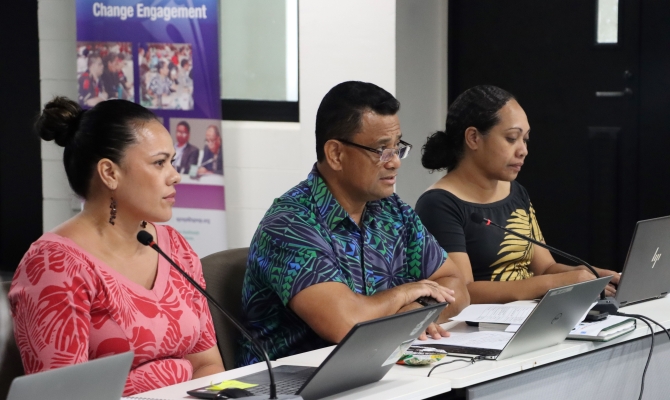
25 June 2024, Apia, Samoa – The management of solid waste has become one of the major concerns for small island countries in the Pacific region.
In particular, improper waste management has the potential to pose a significant negative impact on public health, water and food supply, ecosystems, tourism and trade, availability of resources and climate change, which threatens sustainable development in the Pacific.
Japanese cooperation in waste management in the Pacific Region started in 2000. The beginning of the cooperation included bilateral support from the Government of Japan for upgrading of the Palau M-Dock landfill and the Bouffa landfill in Vanuatu. Through their regional assistance, Japan has dispatched various technical experts and advisers to aid regional waste initiatives.
Since 2011, Pacific Island countries have worked with the Japanese Technical Cooperation Project for Promotion of Regional Initiative on Solid Waste Management in Pacific Island Countries (J-PRISM) to improve their waste management processes nationally.
Samoa has undertaken a number of initiatives including recycling promotion through the Reduce, Reuse and Recycle community awareness programme, improvement of the Tafa’igata landfill and the development of a landfill operation training programme.
The current Pacific Regional Solid Waste Management Strategy 2016-2025 or Cleaner Pacific 2025 was formulated under J-PRISM cooperation and continues to guide national waste activities across the Pacific.
This was highlighted during the first J-PRISM 3 Steering Committee Meeting convened at the Pacific Climate Change Centre hosted at the Secretariat of the Pacific Regional Environment Programme (SPREP) on Tuesday 25 June 2024.
Chair of the J-PRISM 3 Steering Committee Meeting, Ms Fuimaono Katenia Rasch, who is also the Assistant Chief Executive Officer for Samoa’s Ministry of Natural Resources and Environment’s (MNRE) Waste Management and Pollution Control Programme acknowledged the contributions of Japan to the Pacific.
“We acknowledge the significant contributions of the Japanese Technical Cooperation towards waste management in the Pacific through the J-PRISM Project since its inception in 2011,” said Ms Rasch.
“The programme has contributed significantly towards raising the capacity of both government and stakeholders in providing a platform for our regional counterparts to collaborate on effective waste management initiatives.”
Built on J-PRISM Phase 1 and 2, J-PRISM 3 is a result of a 25-year partnership between SPREP and the Japan International Cooperation Agency (JICA) and addresses the waste issue by strengthening independent solid waste management in the Pacific through improving human resource, institutional and financial capacity of solid waste management with developing a monitoring system in targeted Pacific Island Countries.
SPREP Waste Management and Pollution Control Programme Director, Mr Anthony Talouli in his opening remarks highlighted the commitment from project countries to address the waste issue effectively.
“Your attendance today demonstrates the awareness of region of the triple planetary crisis that humanity faces – climate change, biodiversity loss and pollution. It also highlights the importance of the work of J-PRISM and the critical need for solid waste and resource management in the Pacific.”
He further highlighted the successful partnership of SPREP and JICA, “J-PRISM is a great testament to the long-term commitment made by the Government of Japan to the Pacific. A political commitment made by the Government of Japan at the Second Pacific Islands Leaders Meeting (PALM 2), it is unique in its longevity spanning almost 25 years, almost as old as SPREP itself.”
The meeting was held in hybrid format and was attended by implementing agencies, JICA and SPREP, and representatives from the Federated States of Micronesia, Fiji, Marshall Islands, Palau, Papua New Guinea, Samoa, Solomon Islands, Tonga and Vanuatu. It also provided an opportunity for project national counterparts to report back on their activities, successes and challenges from the earlier phases of the project, as well as map a way forward for activities in Phase 3.
For more information on the J-PRISM 3 Project, please contact Project Chief Advisor Mr Satoru Mimura on [email protected]